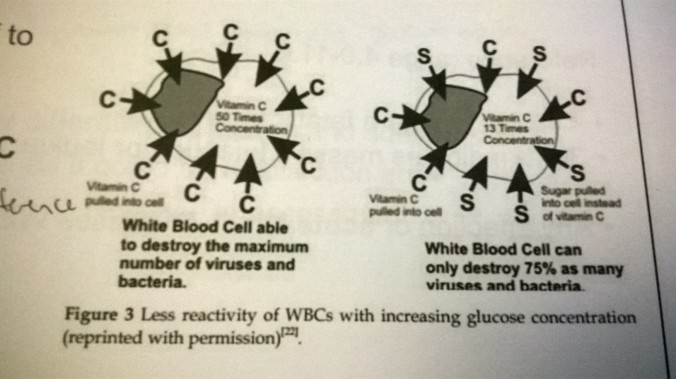I went to a seminar by a naturopathic practitioner-only brand called Eagle the other day, and the speaker was Dr Elizabeth Steele, a clinical biochemist, researcher, nutritionist and one of my former lecturers. One of the things that really stuck in my head and made me think is what she had to say about Vitamin C and our immune response, which is just one role of many for this nutrient.
White blood cells fight infection, consume foreign organisms, produce or distribute antibodies. Neutrophils are a mature granular white blood cell that have the properties of chemotaxis, meaning they stick to immune complexes and then engulf and destroy them and themselves at the same time (Zilio and Serafini 2016). They are the most plentiful type of white blood cell, react within minutes and increase in the blood when there are acute infections, intoxication, haemorrhages and rapidly growing malignancies. Our white blood cell count can vary as much as 2000 a day due to physical stress, smoking, digestion, exercise and minor infection (Steels and North 2016). So if you get a high white blood cell count, don’t ask doctor google and panic.
According to Dr Elizabeth Steels, if you are getting your blood tested and you want to make sure you get an accurate as possible reading:
- Always get your blood drawn between 8 and 9am
- Have a good, healthy meal the night before
- Do not over-exercise the day before
- Get enough sleep
- If you’re female make sure you always get your blood drawn when you’re at the same stage of your menstrual cycle
- Do not take your vitamins and other nutritional supplements for a few days beforehand so we can see what your body’s actually doing
A big sugar hit can reduce your white blood cell’s ability to kill bacteria for up to five hours, as it competes with vitamin C for the same receptor sites. Your neutrophils can’t tell the difference between vitamin C and sugar, and if they’ve taken in sugar instead of vitamin C, they just won’t be activated when there’s something going on. By drinking 1 Liter bottle of soda or by eating 100 gram sugar, the reactivity of white blood cells reduces by 40%. This can make our immune system disabled for 4 or 5 hours. (Ullah, et al 2016)
This is just short term stuff. Imagine the risks that someone who spends years over-eating junk food, doesn’t eat fresh food, drinks alcohol or smokes exposes themselves to, and the kind of disease states that require chronic inflammation or immune under-reaction to take hold, such as diabetes, cardiovascular disease and cancer.
If you’re more the visual type this might make more sense to you:

C is vitamin C, S is sugar. Cool, huh?
So. If you want to stay well, eat your fruit and vegies. Make sure that you consume something that contains vitamin C several times a day. Supplementation is good, if you want to do that kind of thing. Orange juice is okay, but bear in mind that most of the commercially available orange juice, even the fancy stuff, has been reconstituted and possibly imported. (We’ll talk about food importation, irradiation and ethics some other time.) Juice is also a more concentrated source of sugar than the actual fruit itself is. If you’re watching your blood sugar (and if you’re trying to apply what I explained above), eat the fresh fruit and veg. Bear in mind that vitamin C is water-soluble and sensitive to heat. It will be readily available in raw fruit and veges, especially leafy greens. Loss is minimised when vegetables such as broccoli or Brussels sprouts are cooked over water in a double boiler.
Ascorbic acid is readily absorbed from the intestines, ideally about 80-90 percent of what is ingested, and then used by the body about two hours after consumption and out of the body within about three or four hours. This is why it is recommended to take vitamin C supplementation at four hour intervals rather than just once a day, or take a time-released supplement. Vitamin C is used up even more rapidly when you are stressed, with alcohol use and with smoking. Fevers, viral illnesses, antibiotics, cortisone, aspirin, other pain meds, environmental toxins and heavy metals reduce the absorption of vitamin C, and sulfa antibiotics increase its elimination (Haas, 1992).
The best sources are citrus fruits, paw paw, rockmelon and berries. Good vegie sources include red and green capsicum, broccoli, Brussels sprouts, tomatoes, asparagus, parsley, dark leafy green vegies, cabbage and sauerkraut. It is only found in grains, seeds and beans when they are sprouted.
So how much sugar do you eat in a day? How much vitamin C? I know naturopaths talking about vitamin C uptake is pretty old school in this day of superfoods, fodmaps and gut microbiomes. That doesn’t mean the simple things are less valid.
References
Anderson, D. M. (2003) Dorland’s Illustrated Medical Dictionary, 30th Edition. W B Saunders Company, Philadelphia USA.
Haas, E. M. (1992) Staying Healthy with Nutrition. Celestial Arts Publishing, California
Sharma, RK and Sharma B (2012) “In-vitro carbofuran induced genotoxicity in human lymphocytes and its mitigation by vitamins C and E”. Disease Markers, volume 32, issue 3; p153-163
Steels, E and North, P (2016) “The Clinic Detective – Assessing Immunity in Practice, Pathology and Nutritional Indicators” Eagle Professional Natural Medicine
Ullah, H. Akhtar, M. Hussein, F and Imran, M (2016) “Effects of Sugar, Salt and Distilled Water on White Blood Cells and Platelet Cells”. Journal of Tumor, Volume 4, Number 1; p354-358
Zilio, S, Serafini, P (2016) “Neutrophils and Granulocytic MDSC: The Janus God of Cancer Immunotherapy” Vaccines, volume 4, issue 3; p31-37